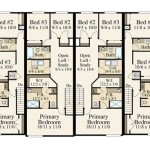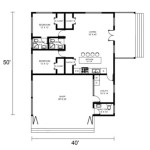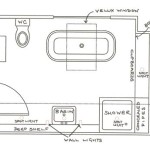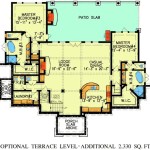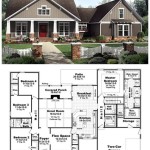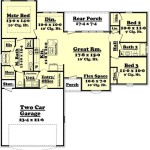Understanding the Floor Plan of a House: A Comprehensive Guide
The floor plan of a house serves as a crucial blueprint, providing a scaled diagram that visually represents the arrangement of rooms and spaces within a structure. It offers a bird's-eye view of the building, outlining the dimensions, layouts, and relationships between different areas. Understanding how to read and interpret a floor plan is essential for various stakeholders, including homeowners, architects, builders, interior designers, and real estate professionals. This document aims to offer a comprehensive guide to the elements and interpretation of a house floor plan.
Floor plans are typically created using specialized architectural software or drawn manually with drafting tools. Standard symbols and conventions are employed to ensure clarity and consistency. These conventions are followed almost universally across different regions to facilitate easy understanding and communication among building professionals.
The information presented on a floor plan is invaluable during the design, construction, renovation, and sale of a property. It allows for informed decision-making regarding space utilization, furniture placement, traffic flow, and overall aesthetics. Furthermore, a well-designed floor plan can significantly impact the functionality and livability of a home.
Key Point 1: Essential Elements of a Floor Plan
A thorough understanding of the various elements incorporated within a floor plan is fundamental to accurate interpretation. These elements collectively provide a comprehensive representation of the house's spatial organization.
Walls: Walls are depicted using thick, solid lines. These lines represent the physical barriers that define the rooms and spaces within the house. The thickness of the lines can sometimes indicate the type of wall, such as a load-bearing wall versus a partition wall. Dimensions are often indicated to show the length of the wall.
Doors: Doors are typically shown as an arc sweeping from the door jamb to the open position. This indicates the direction in which the door swings. The door's width is also usually indicated on the plan. Different door types, such as sliding doors or bi-fold doors, are represented with specific symbols.
Windows: Windows are represented by two parallel lines, often with a break in the middle for the glass pane. The size and type of window (e.g., casement, double-hung) are often indicated near the window symbol. The height of the window from the floor (sill height) might also be specified in architectural drawings.
Stairs: Stairs are depicted as a series of parallel lines, with an arrow indicating the direction of ascent or descent. The number of stairs, the riser height, and the tread depth are often noted on the plan.
Fixtures and Appliances: Plumbing fixtures like toilets, sinks, bathtubs, and showers are shown using standard symbols. Kitchen appliances, such as refrigerators, ovens, and dishwashers, are also represented symbolically. These symbols provide a clear indication of the location and size of these essential elements.
Dimensions: Dimensions are typically indicated using dimension lines and extension lines. The overall dimensions of the house, as well as the dimensions of individual rooms and features, are crucial for understanding the scale of the space. Dimensions are usually expressed in feet and inches or meters and centimeters, depending on the regional conventions.
Labels: Each room or space is labeled with its intended function, such as "Living Room," "Bedroom," "Kitchen," or "Bathroom." These labels help to quickly identify the purpose of each area and aid in understanding the overall layout.
Compass Rose/North Arrow: A compass rose or a simple north arrow indicates the orientation of the house on the property. This information is important for understanding how sunlight will enter the house at different times of the day and for planning landscaping.
Scale: The floor plan includes a scale, such as 1/4 inch = 1 foot or 1:50. This scale indicates the proportion between the drawing and the actual dimensions of the house. Understanding the scale is essential for accurately measuring distances and determining the size of furniture and other items.
Key Point 2: Interpreting Spatial Relationships and Flow
The floor plan is not just a diagram of individual rooms; it also reveals the relationships between those rooms and the flow of movement throughout the house. Understanding these spatial relationships and flow is crucial for assessing the functionality and desirability of the floor plan.
Circulation Paths: The floor plan indicates how people will move from one room to another. Pay attention to the location of hallways, doorways, and stairs. A well-designed floor plan will have efficient circulation paths that minimize unnecessary steps and provide easy access to all areas of the house.
Zoning: Floor plans often incorporate zoning principles, which involve separating different types of activities into distinct areas. For example, the sleeping zone (bedrooms) is typically located away from the living zone (living room, dining room) to provide privacy and quiet. The service zone (kitchen, laundry room) is often located near the entrance for easy access to utilities.
Open-Concept vs. Closed-Concept: The floor plan reveals whether the house has an open-concept layout or a closed-concept layout. Open-concept layouts feature large, interconnected spaces without walls separating them, while closed-concept layouts have distinct rooms separated by walls. Each approach offers different advantages and disadvantages in terms of privacy, noise control, and spatial perception.
Privacy and Accessibility: The floor plan should be evaluated in terms of privacy and accessibility. Bedrooms and bathrooms should be located in areas that offer privacy from the main living areas. Consider the accessibility of different areas for people with disabilities or mobility limitations. Features such as wide doorways, ramps, and accessible bathrooms are important considerations.
Natural Light and Ventilation: The location of windows and doors on the floor plan indicates how much natural light and ventilation the house will receive. South-facing windows tend to provide the most sunlight, while north-facing windows offer more consistent, diffused light. Cross-ventilation, achieved by placing windows on opposite sides of a room, can help to improve air circulation and comfort.
Relationship to Outdoor Spaces: The floor plan shows the relationship between the interior spaces and the outdoor spaces, such as patios, decks, and gardens. Consider how easily you can access these outdoor spaces from different areas of the house. A seamless connection between indoor and outdoor spaces can enhance the livability of the home.
Key Point 3: Utilizing a Floor Plan for Decision Making
The floor plan is a powerful tool that can be used to inform a wide range of decisions related to the house, from initial design to final decoration. By carefully studying the floor plan, you can make informed choices that will enhance the functionality, aesthetics, and value of the property.
Furniture Placement: The floor plan allows you to visualize how furniture will fit into each room. Measure your furniture and compare the dimensions to the floor plan to ensure that there is enough space for comfortable movement and arrangement. Consider the placement of outlets and light fixtures when planning furniture placement.
Renovation Planning: The floor plan is an essential tool for planning renovations. It allows you to visualize the impact of proposed changes on the overall layout and functionality of the house. Consider how changes to walls, doors, and windows will affect the flow of movement and the amount of natural light in each room.
Space Planning: The floor plan allows you to assess the efficient use of space. Identify any areas that are underutilized or poorly designed. Consider how you can reconfigure the layout to make better use of the available space.
Understanding Building Codes and Regulations: Floor plans are often reviewed to ensure compliance with local building codes and regulations. These codes may dictate minimum room sizes, ceiling heights, and egress requirements. Understanding these requirements is crucial for ensuring the safety and legality of the construction.
Evaluating Property Value: The floor plan is a key factor in determining the value of a property. A well-designed floor plan that meets the needs of modern homeowners can significantly increase the resale value of the house. Consider the number of bedrooms and bathrooms, the size of the living spaces, and the overall functionality of the layout when evaluating the property's value.
Communication with Professionals: The floor plan serves as a common language for communicating with architects, builders, interior designers, and other professionals. By clearly articulating your needs and preferences using the floor plan as a reference, you can ensure that your vision is accurately translated into the final product.
In conclusion, mastering the interpretation of a house floor plan unlocks a wealth of information critical for understanding space, functionality, and design considerations. By paying attention to the essential elements, spatial relationships, and the potential for informed decision-making, individuals can confidently navigate the intricacies of architectural blueprints and leverage them for improved living spaces and property value.

House Plans How To Design Your Home Plan

House Plans How To Design Your Home Plan

House Plans How To Design Your Home Plan

Small House Plan Ideas For Diffe Area To See More Read It Floor Plans

Floor Plans Types Symbols Examples

Small House Design 2024001 Pinoy Eplans Floor Plans

How To Read A Floor Plan With Dimensions Houseplans Blog Com

Peach Tree House Plan Ranch Floor Designs

Typical Floor Plan Small Apartment Building House Plans Residential

Floor Plan Creator And Designer Free Easy App


